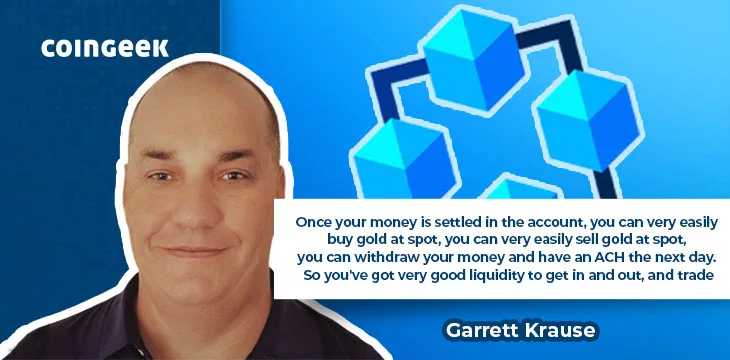|
Getting your Trinity Audio player ready...
|
“Hopefully, gold will be money in the future, like it was in 1971… hopefully, we’re bringing the old gold standard back for the future,” says Garrett Krause of TroyMoney. Speaking with Brad Holland on the 5GOATs podcast, he describes TroyMoney’s vision as one where users can buy and sell tokenized precious metal assets with high liquidity or even use it as daily spending money. It’s all possible with the low-cost, high-speed, high-capacity BSV blockchain.
“I know there are going to be some subtle differences to the way you go about solving these problems,” Holland says, noting the vast number of existing ways people can buy and trade physical or vaulted gold. “You have solved things in a unique way.”
“I’m a real-world type of operator,” Krause says, describing the 35 years he spent in commodities trading: mining, minerals, oil and gas. He says he was one of the first people to see the potential of tokenized physical assets on a blockchain and tried to do so in 2017, after which he underwent the “trials and tribulations” of attempting to build on Ethereum for several years.
Krause recently posted on LinkedIn: “This Ethereum pig is slow, does not scale, with very expensive transaction fees and holds no real data on chain.”
He says he initially intended to build TroyMoney “for people like me—Baby Boomers, people who have never really used crypto before, don’t really understand the blockchain, but we want to own gold without having physical delivery of it.”
Yes, there are many other “gold-backed” blockchain digital assets out there, Krause says, but people like him “don’t want a crypto, we don’t want to lose our keys, we want gold as a security token, backed by a certificate of ownership, that can be transferred and used.”
TroyMoney’s wallet and platform is built on Tokenized, and its parent company, WorldVest, bought an equity stake in Tokenized as part of its commitment. Ownership of TroyMoney gold is tied to a person’s identity, not their private keys. “At no time can you actually lose your physical asset. Your tokens might go away, but then they’re frozen, they’re re-issued, a new wallet is created, and your gold shows back up.”
The wallet also keeps track of short- and long-term capital gains and calculates any tax obligations (where they reply). It can pull all relevant data from the blockchain to produce reports for users to use on their tax returns.
Keeping savings as fiat in a bank account is a losing proposition, Krause says, thanks to inflation. TroyMoney gold (they also plan to add silver, platinum, and palladium) is stored securely in Brinks vaults (NYC or Zurich) and uses StoneX as its liquidity provider. He acknowledges some counterparty risk always exists in these arrangements, but they chose those two providers on the basis that they’re trusted companies in stable financial jurisdictions. There’s also the potential to add other physical commodities to the TroyMoney ecosystem, perhaps more volatile assets like barrels of oil.
Liquidity and low fees are key TroyMoney features
TroyMoney onboards users with cash or other digital assets, whatever type of value they choose. “Once your money is settled in the account, you can very easily buy gold at spot, you can very easily sell gold at spot, you can withdraw your money and have an ACH (Automated Clearing House payment) the next day. So you’ve got very good liquidity to get in and out, and trade.”
An additional feature not common among TroyMoney’s competitors is users’ ability to borrow (fiat) money against their balance. Should some kind of expensive emergency arise, TroyMoney customers can borrow up to 80% of the value of their balance at the same rate as a bank and receive the money within a few hours without having to sell their precious metal assets. For the record, that’s incredibly fast compared to doing the same with other valuable assets, like a house.
It’s even possible to “spend” that tokenized metal for daily purchases—with the caveat that both parties to the transaction need to accept that form of payment. TroyMoney is working on a merchant platform to handle this, due for release in 2024. They’re also working on other partnerships, perhaps with credit card companies and money transfer operations like MoneyGram.
Krause mentions the BSV blockchain by name, pointing out that he chose that particular network because it’s “a very economical blockchain, very low gas/transaction fees, and very high scale.” For any merchant accepting TroyMoney payments, it means near-instant transactions at a fraction of a U.S. cent each and no 3%+ merchant fee as credit card companies charge. Merchants will have the option to either keep the gold or instantly sell it to receive fiat.
This could potentially replace your bank account, Holland notes. Krause replies that this is true but only to a certain extent. You’ll still need a bank account to handle those initial onboarding payments (or receive money from selling/drawing against your gold). Plus, it’ll still be necessary to have some kind of fiat balance to pay your mortgage, pay taxes, etc. Hopefully, he says, if TroyMoney gains widespread merchant acceptance, you’ll be able to store your value that way.
TroyMoney is taking pre-registrations now and plans to launch this October.
Watch: Tokenizing gold on Bitcoin & the new BSV stablecoin

 03-03-2026
03-03-2026 




